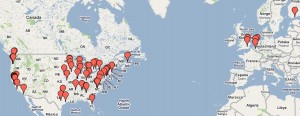This weekend marketing analyst Jeremiah Owyang assembled a fabulous list of nearly 200 people who run social media strategies at corporations around the world. It’s the second year he’s done so and let me tell you: there are few things more wonderful than a well-categorized list of people.
Jeremiah listed the names, titles and employers of each person on his list and he linked to their LinkedIn profile. I wanted to interact with these people on Twitter, for many different reasons, so last night I spent a couple hours putting together some resources that we can all use.
First and most important is this: a Twitter list of 141 of these people that I was able to find accounts for. Follow that puppy and you’ll be able to interact with all 141 people in one place. I’ve got them coming into a column in Tweetdeck and it’s never been so easy to interact with so many leading minds behind social strategies at some of the world’s biggest companies. This would probably make a pretty interesting Flipboard magazine, too.
I used a number of different tools to create a number of different little things you can see below – but I’ve saved what I think is the best for last.
Compiling this list was the slowest part of everything else I did here, but even that didn’t take too long. I went down Jeremiah’s blog post and highlighted the names one at a time. I’m using the Apture semantic browser plug-in and it could tell these were peoples’ names. One of the first things it looks for when it sees a name is a Twitter account, so I just opened those up in new tabs to make sure they were correct and then added those people to my list. It was pretty fast. I considered uploading the list of 200 to Mechanical Turk and paying people 5 cents per username they found, but I decided that the $20 that would have cost (to have each name checked twice) wasn’t as big a cost as the lost opportunity of getting to see each of these people and their profiles myself. So I took a few hours on a Sunday night to make the list.
Update: Jeremiah very graciously shared this post out with his contacts but asked how we could keep the Twitter list and related resources up to date as he frequently adds new names to his list. I had to think about that for a moment, but then settled on this solution: I’ve pointed Yahoo’s Dapper at the page to check every 15 minutes or so if there are any new names on the list. If there are, the new addition will be delivered into an RSS feed. I’ve subscribed to that feed in Notify.me and told it to send me any updates by IM and by email. So when Jeremiah adds anyone to the list, I’ll get a ping and will add them to the Twitter list! Screenshot of the Dapper interface below. Much like Needlebase – it’s point and click easy.

Let’s Scrape The Data!
Now that I had 141 of these people all in a nice Twitter list, where they could be found with a single URL, all kinds of fun things become possible. I used a service called Needlebase to scrape all the usernames, locations, bios and follower/following numbers from each person on that list. Training and running all that took me about 5 minutes. Then I exported that data in CSV format and played with it in some interesting ways.
Some simple math:
- The corporate social strategist on the list with the most followers? Ford’s Scott Monty with 48,705 followers. Followed by Collin Douma VP of Social Media at Proximity BBDO, the super-charming Shashi Bellamkonda of Network Solutions, @RichardatDell and my friend since we were high school debate competitors, Justin Kistner of Webtrends.
-
Who’s following the most people? Douma’s following nearly 40k people, and the rest of the top 5 is close to the same as above but with the addition of H&R Block’s Zena Weist, who follows just shy of 10k users.
Here’s a chart of the distribution showing number of people a strategist follows. I lopped off the top two at 40k so we could see the rest of the chart better.

-
Who has Tweeted the most? Shashi Bellamkonda is far in the lead, with 45,184 Tweets. In case you’re curious, that means Shashi has posted an average of 32 Tweets each day for the 3.5 years he’s been on Twitter. He’s even more fun in person, by the way. #2 most prolific? Capgemini’s Rick Mans, who lives in the Netherlands. #3 is Devry University’s Sonny Gill.
- Who’s been on Twitter the longest? As far as I can tell, The most recent person on the list to join Twitter is ECI Telecom’s Colleen Seery, who appears to have created her account just under two months ago. (Update: Seery explains in comments below that she’s been using Twitter for more than a year, she just created a new account this Fall.) Every single other person on the list who uses Twitter has been using it for 299 days or more, and only 1 out of every 7 have been on Twitter for under two years. What does that mean? That these people learned fast, perhaps, and that there’s not a lot of new blood among people in charge of social. Maybe it means you shouldn’t expect to run social strategy at a corporation if you’ve used Twitter for less than 2 years.
- The average Twitter account on our list is being followed by 2,758 people. If you remove Scott Monty from the list, the average is 2,430. Here’s a chart of the spread. Sorry it’s not a prettier chart.

- Who’s been at their current jobs the longest among all the members of Jeremiah Owyang’s list? He’s linked to LinkedIn profiles and though LinkedIn doesn’t really like to be scraped, Needlebase was able to do a decent job. It appears that the senior-most person on the list is Todd Watson, Turbotodd, who’s been at IBM for more than 19 years. Who on the list has the freshest job, according to their LinkedIn profile? Mike Boehmer, who according to Foursquare checked in at the first day of his new job as Media Manager at Catholic Health Partners in Cincinnati this morning. (Congrats Mike!)
Text Analysis
How do corporate social strategists describe themselves on Twitter? I scraped everyone’s bio descriptions, put those words into a text file, found and replaced all instances of the words social, media and marketing, then uploaded what remained into Wordle.net. It looks like people feel very comfortable referencing their personal lives in their Twitter profiles. Click below to view full sized.

Location
Needlebase makes it pretty easy to map people and places, too. Here’s everyone globally on the list, sorted by city. You can click it for a full-size view too.

How about a map of cities with strategists who have Tweeted more than 5,000 times? That’s the most prolific Tweeters, about 1/3 of the list. That map looks a little bit different, but not too much.

The Best for Last
All of the above is pretty interesting I think, but besides the Twitter list of all these people made easy to follow in one place – there’s one other resource that I think is likely to prove valuable in the long run. That’s figuring out who these influencers listen to the most themselves. The lists of who they are following on Twitter are all publicly available, so it’s just a matter of scraping and counting.
Who do the largest number of these people follow in common? #1 is of course Jeremiah Owayng himself, the man who made the list! 117 out of 141 of the Twitter accounts I found on this list were following Jeremiah. I don’t know what excuse the other 24 have. Rounding out the top 10:
Mashable, Charlene Li, Brian Solis, Chris Brogan, Robert Scoble, TechCrunch, Zappos, Guy Kawasaki, Forrester and Scott Monty. In other words, basically who you might expect. Here’s a list you can use to subscribe to the accounts in that group that publish less than 30 updates a day.
That’s the kind of fun you can have with a good list of well categorized people and some free, easy-to-learn data extraction tools! Thanks to Jeremiah Owyang for putting together the list and thanks to you for visiting my site to read about it.







